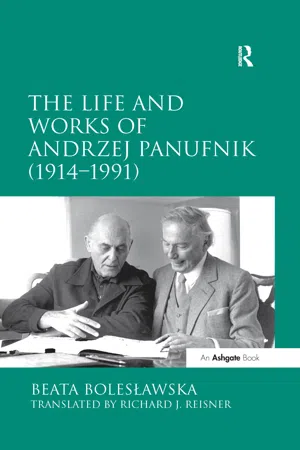
The Life and Works of Andrzej Panufnik (1914–1991)
- 226 pages
- English
- ePUB (mobile friendly)
- Available on iOS & Android
The Life and Works of Andrzej Panufnik (1914–1991)
About This Book
Sir Andrzej Panufnik was born in Warsaw and studied in the newly independent Poland in the 1930s, as well as in Vienna and Paris just before the outbreak of the Second World War. During the German occupation he formed a piano duo with his friend and fellow composer Witold Lutoslawski, and they performed in caf around Warsaw. After the war, Panufnik quickly established himself as a leading Polish composer, and as a conductor he played a significant role in the re-establishment of first the Krak nd then the Warsaw Philharmonic. Although he was considered Polands leading composer for some years after the war, Panufnik was subsequently put under intolerable pressure both musically and politically. Frustrated by the continuing rejection of his compositions and the unending political demands inflicted on him by the country's post-war Communist regime, he made a daring escape to England in 1954. He briefly became Principal Conductor of the City of Birmingham Symphony Orchestra, a post he relinquished after two years to devote all his time to composition. His works were in demand by major figures such as Leopold Stokowski who conducted the first performances of Sinfonia Elegiaca, Katyn Epitaph and Universal Prayer, Yehudi Menuhin who commissioned the Violin Concerto, Seiji Ozawa in Boston and Sir Georg Solti in Chicago who both commissioned symphonies for the centenaries of their famous orchestras; also Mstislav Rostropovich with the London Symphony Orchestra, who together commissioned the Cello Concerto. Beata Boleslawska has written the first book on the life and artistic output of Panufnik, setting his significance alongside the political and cultural scene of twentieth-century Europe. The account of the composer's life is based on numerous archival documents, as well as the personal accounts contributed by his family and friends. Panufnik's compositional style and techniques are also analysed. This book will be of interest not only to those devoted
Frequently asked questions
Information
Table of contents
- Cover
- Half Title
- Title Page
- Copyright Page
- Dedication
- Table of Contents
- List of Plates
- Foreword to the English Edition
- Preface: Panufnik: A Life
- 1 Early Years
- 2 Education and First Attempts at Composition
- 3 The Second World War and the Nazi Occupation
- 4 The New Reality – The First Years after the War
- 5 Socialist Realism and the Decision to Emigrate
- 6 Escape from Poland and First Years in a New Homeland
- 7 Birmingham – The Conductor and a Return to Composition
- 8 Success of Sinfonia Sacra, Marriage and the Beginning of Stabilisation
- 9 The Search for a New Musical Language, and Artistic Flourishing after 1968
- 10 The Last Decade – The Years of Fulfilment
- 11 Andrzej Panufnŕk’s Compositional Style – A Sketch
- 12 Symmetry in the Composer’s Self-Reflection
- 13 Symmetry in Terms of Harmony and Tonality
- 14 Symmetry in Terms of Musical Syntax
- 15 Symmetry of Form
- Afterword
- Chronological List of Compositions
- Index